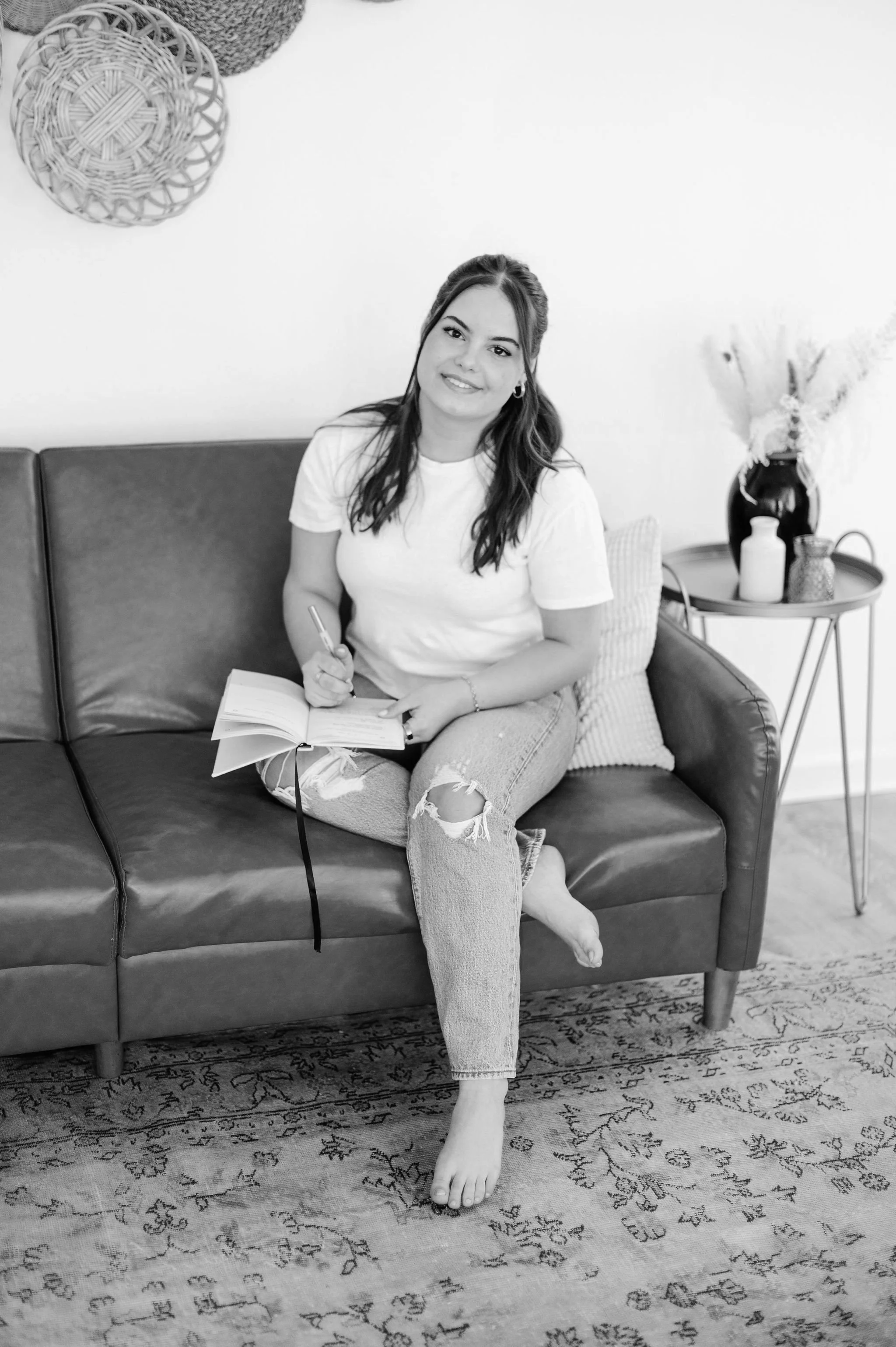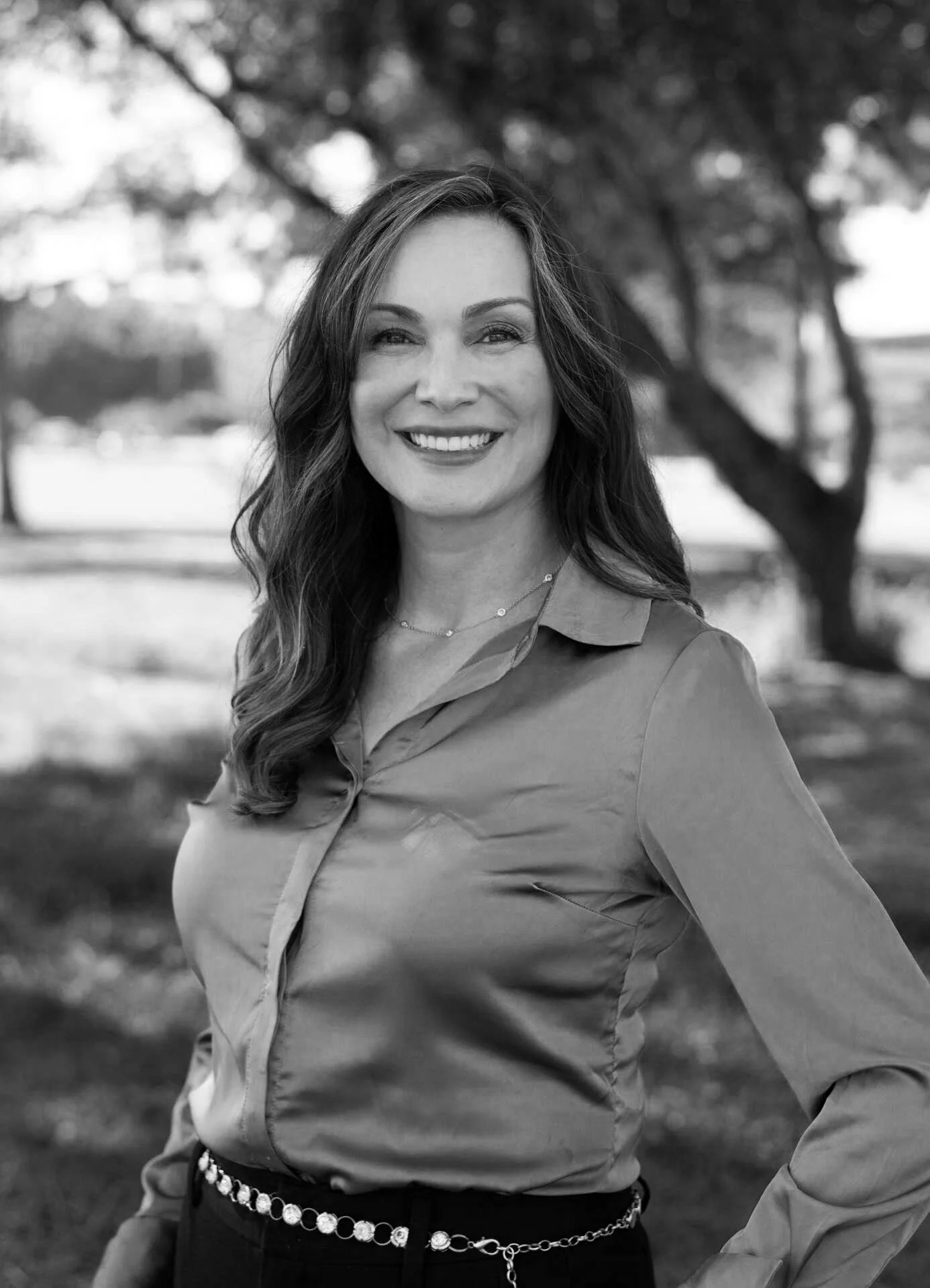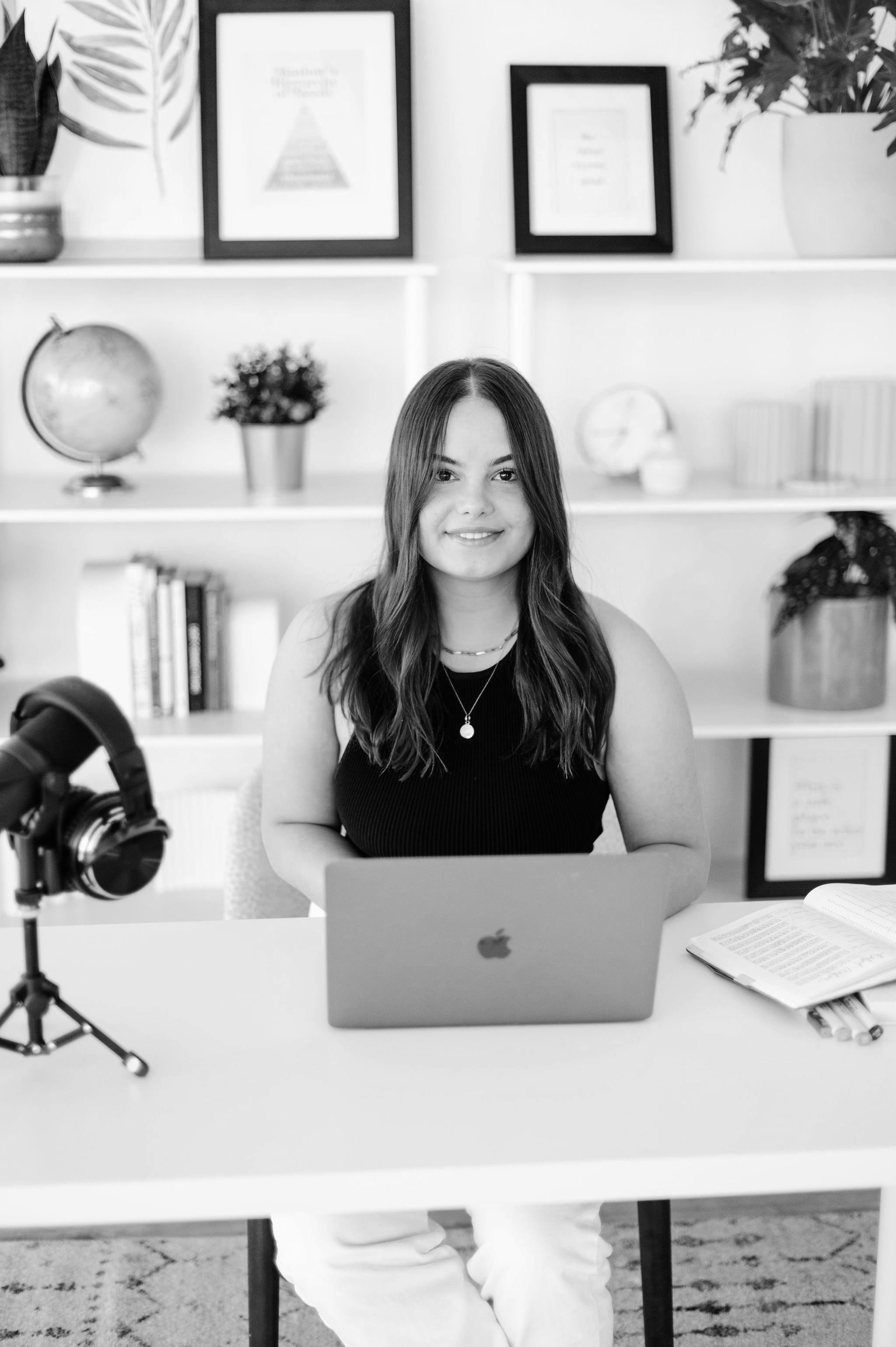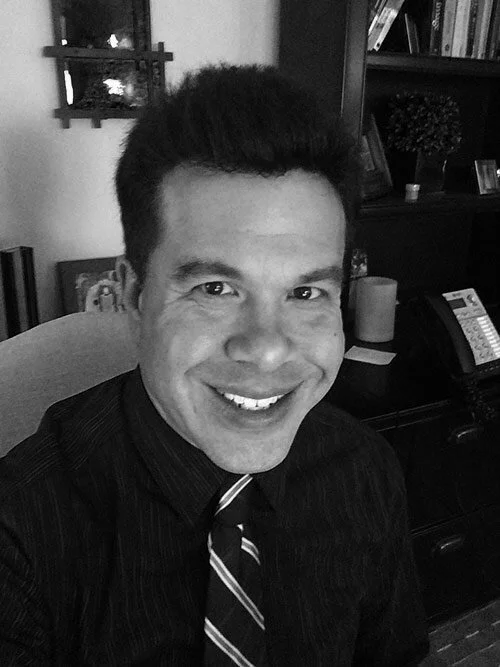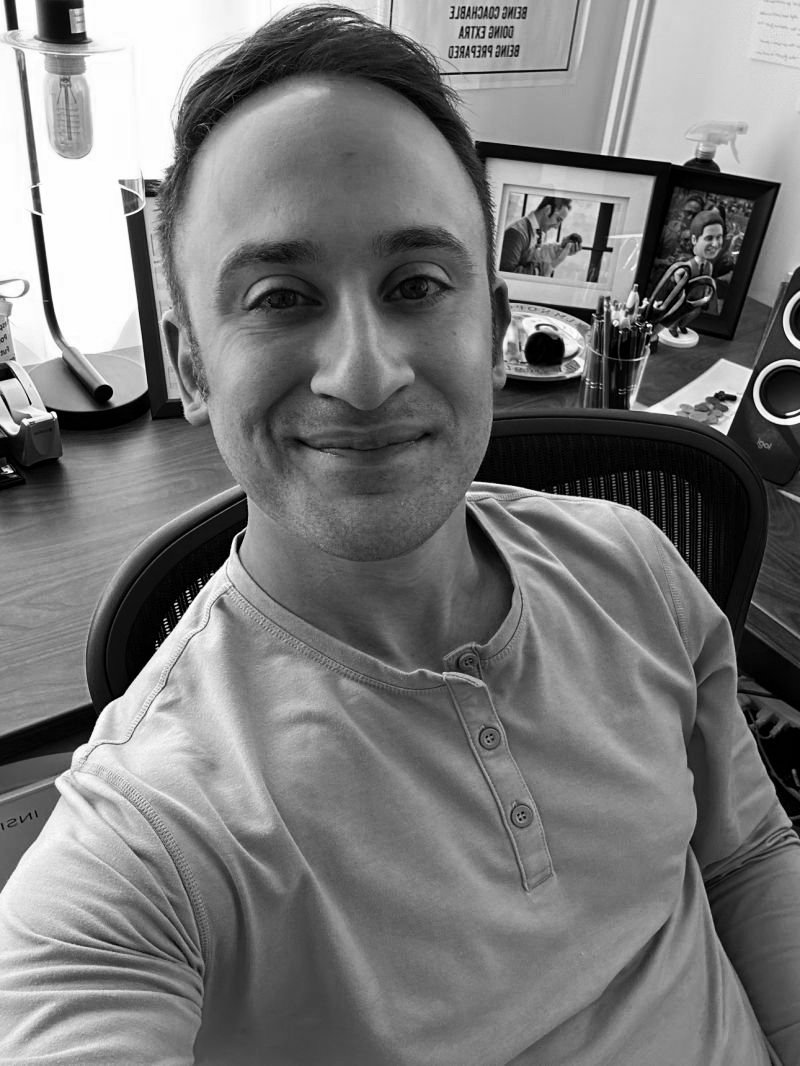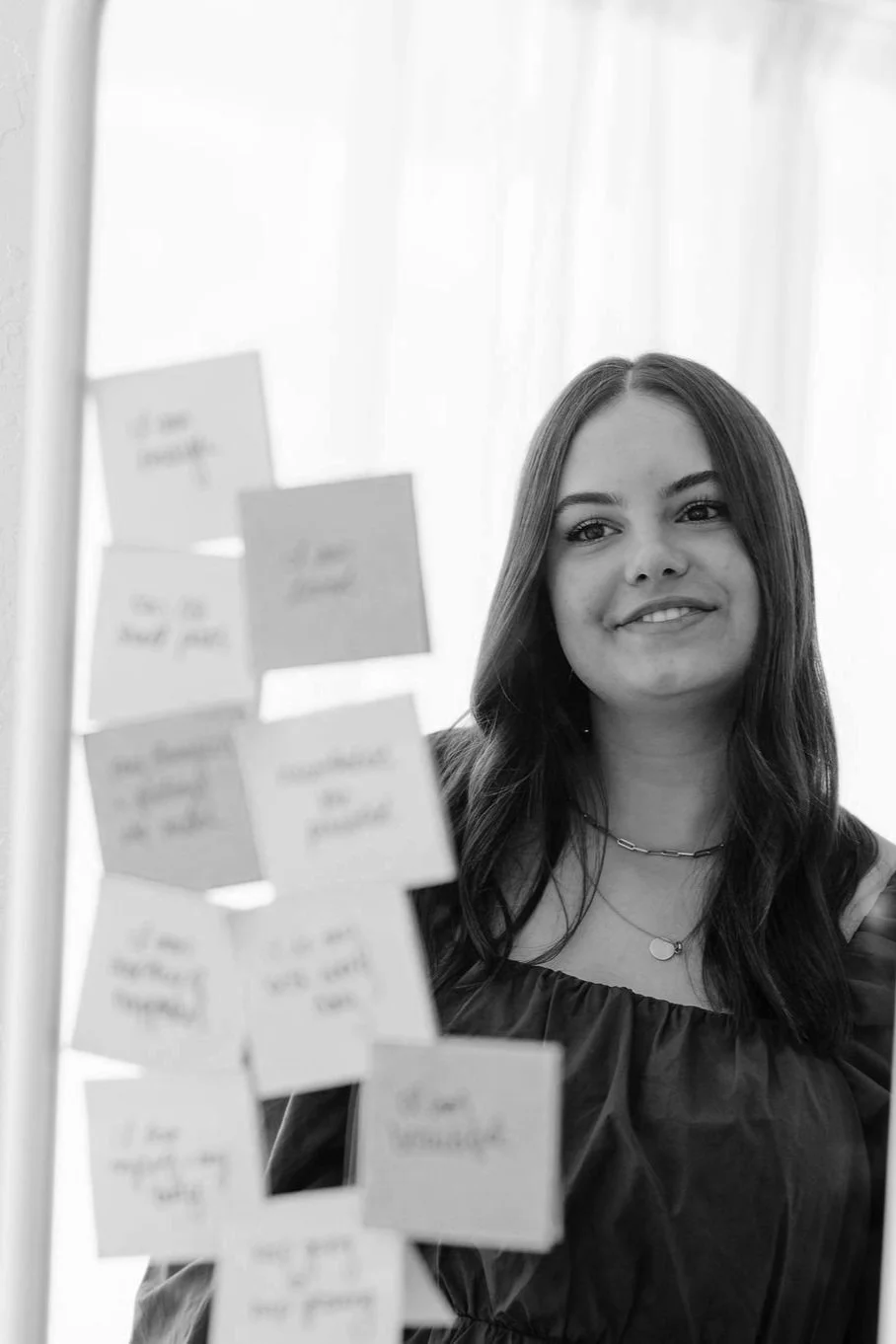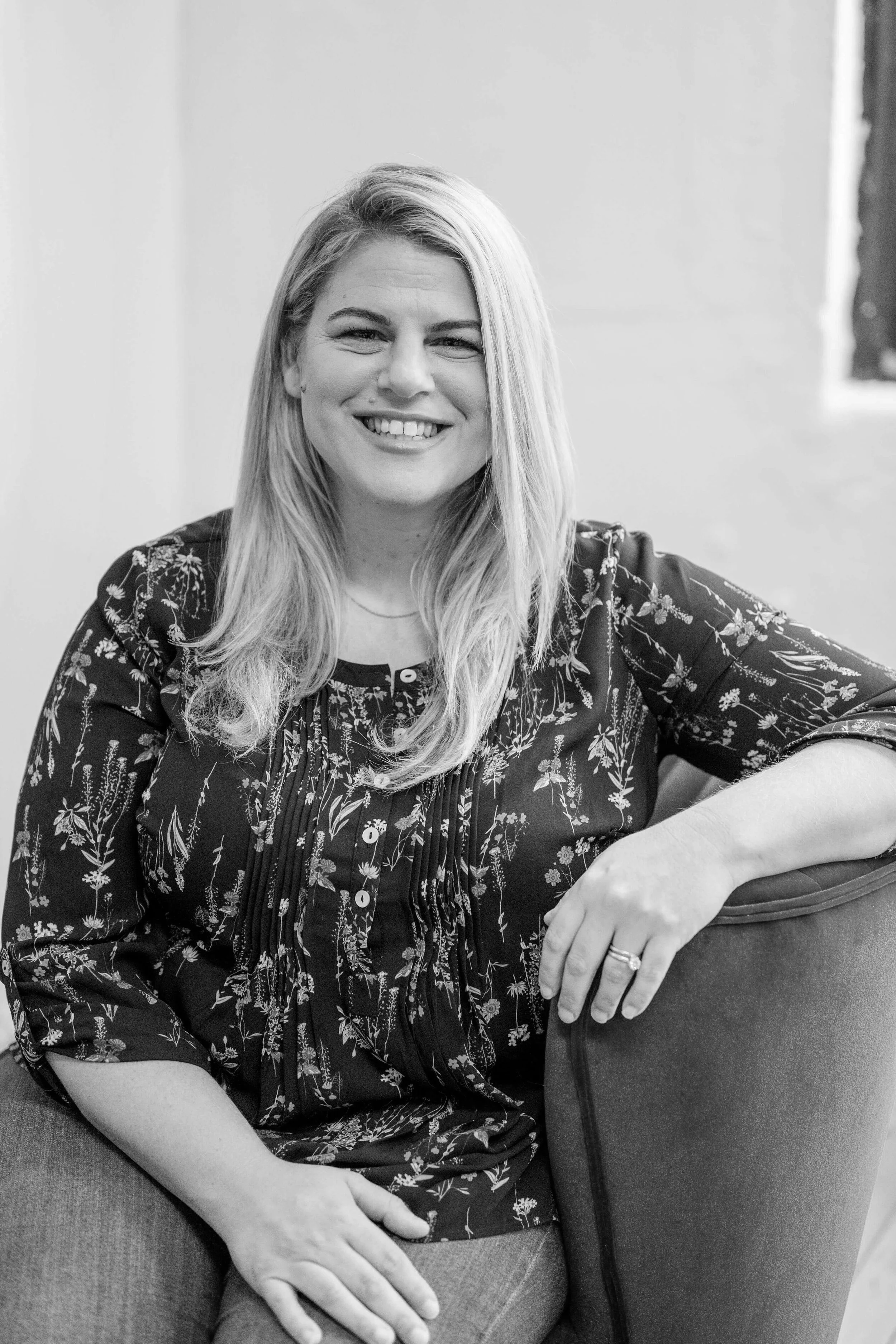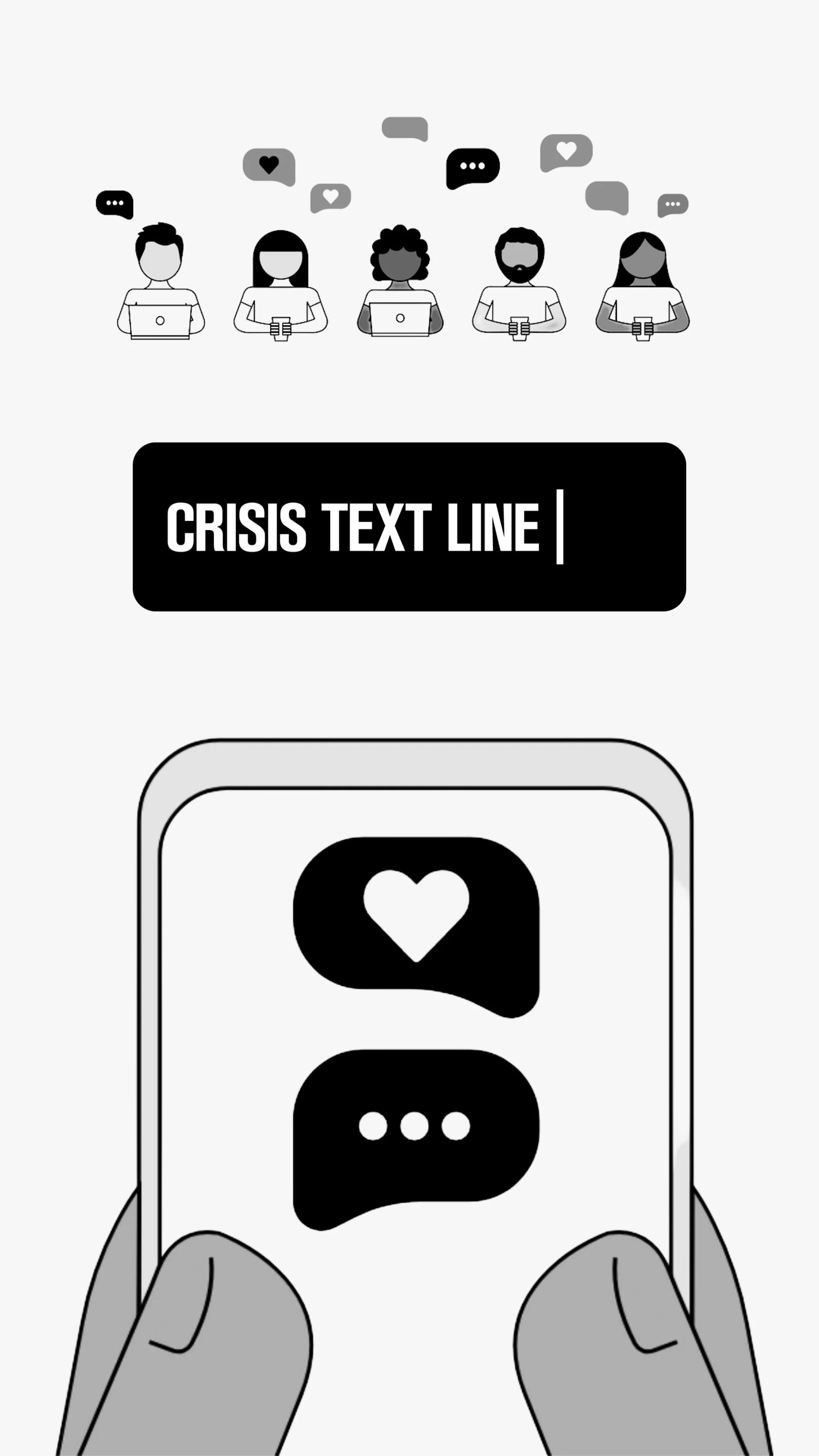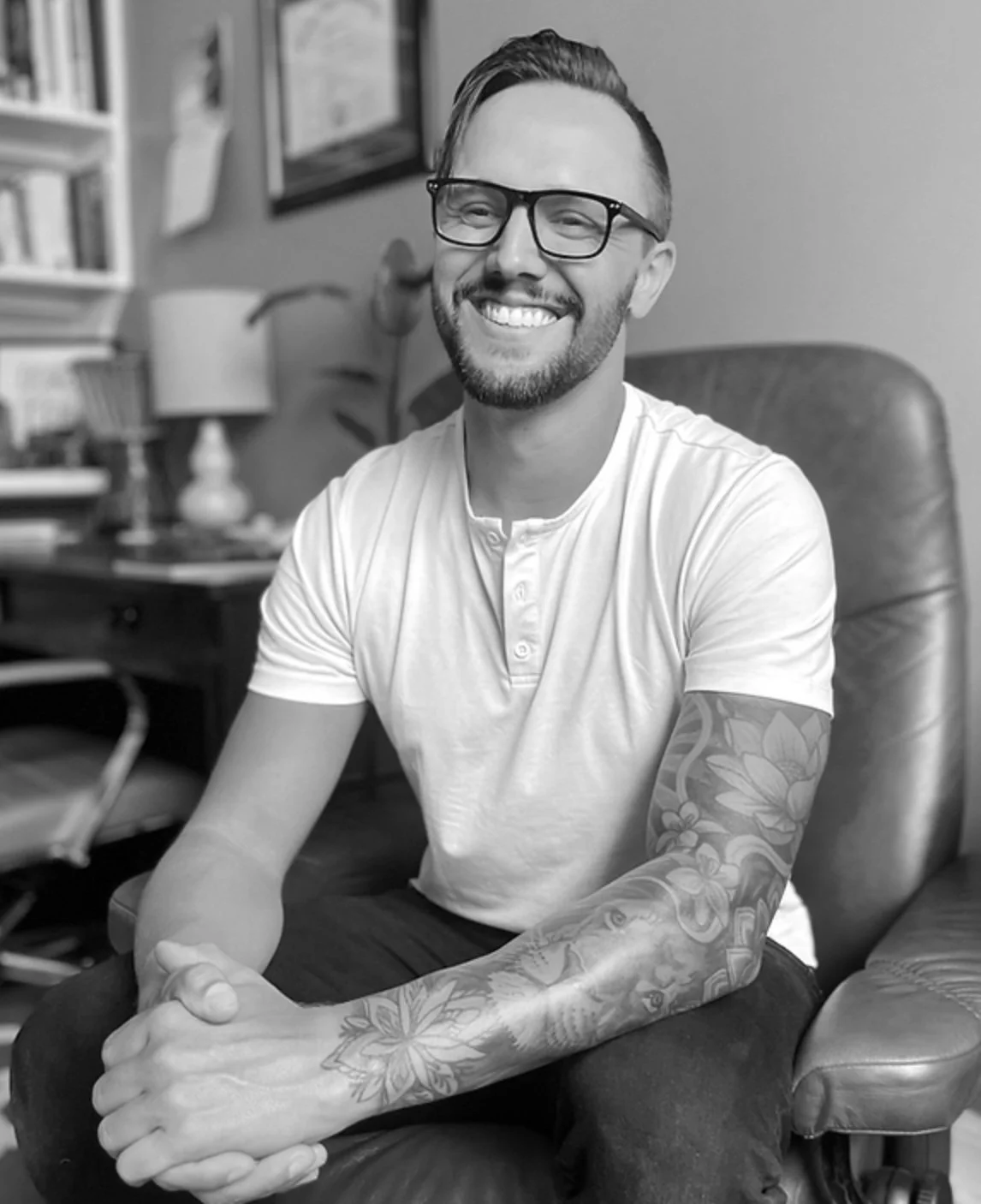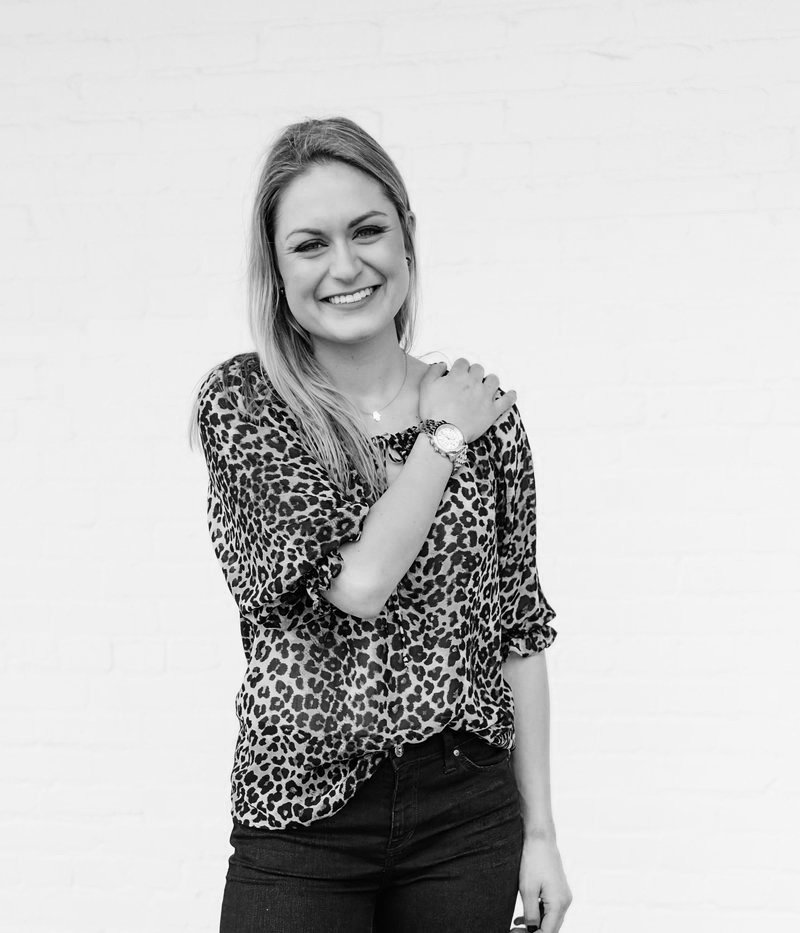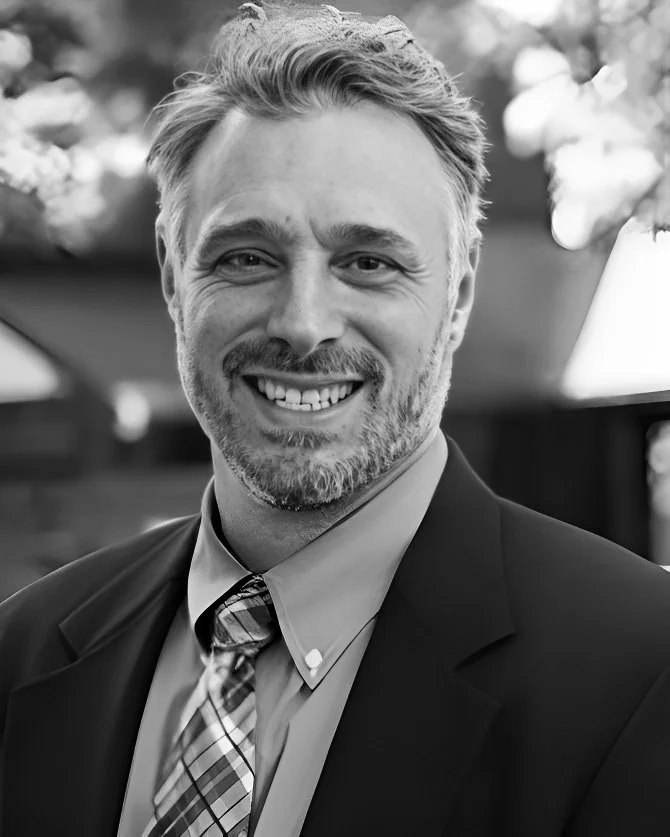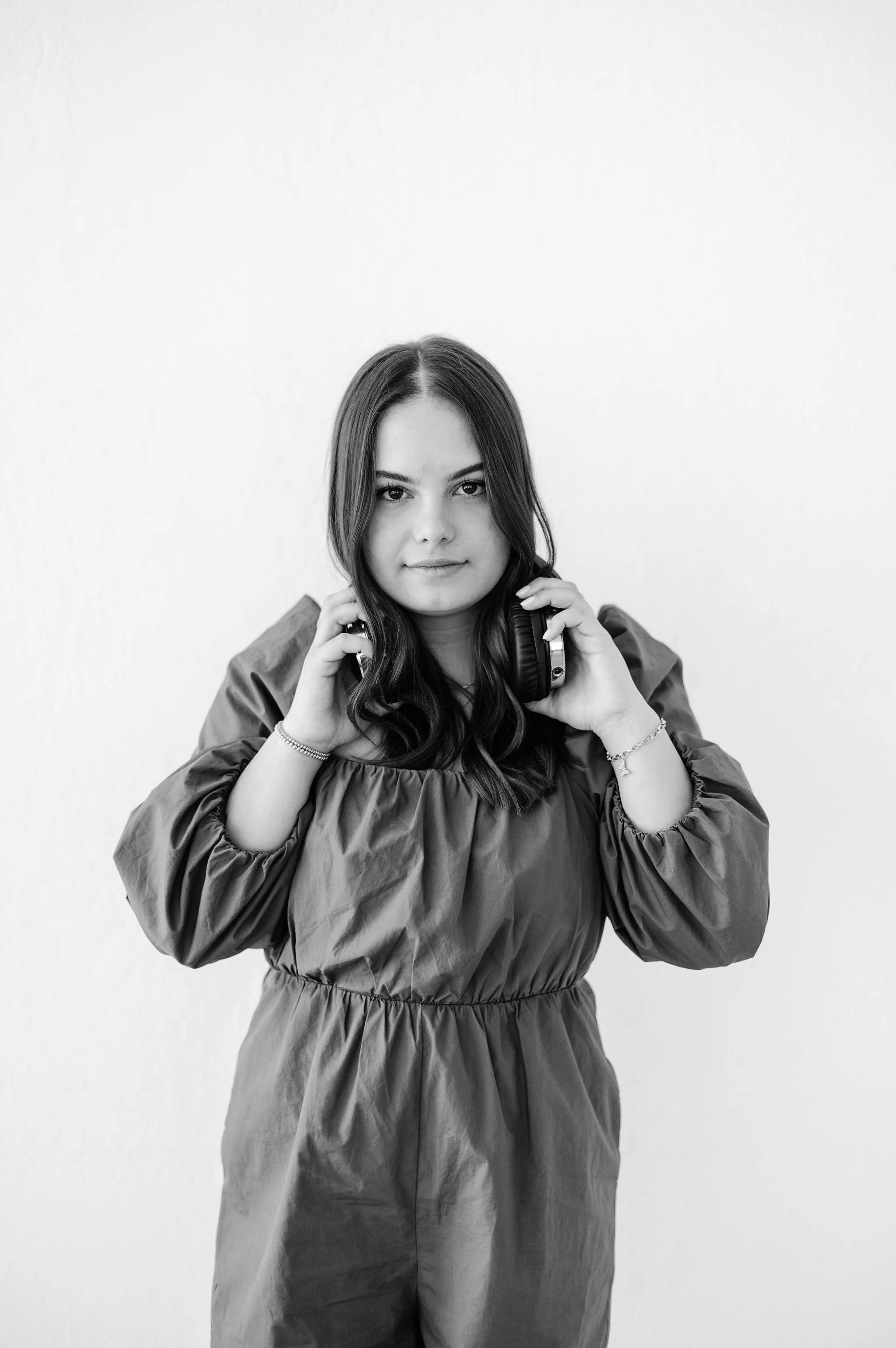158. Your TikTok Therapist on Gen Z Mental Health, Staying Optimistic, and Talking to Your Parents About Your Mental Health
listen to this episode:
Tune in and subscribe on your favorite platform: Apple Podcasts | Spotify | Stitcher | Google Play | Radio Public | PocketCasts | Overcast | Breaker | Anchor
Today's guest is Leandro Olszanski— a board-certified psychotherapist with 10+ years of experience helping teenagers, adults, and couples navigate their unique life challenges. He also shares mental health content on TikTok as @your.tiktok.therap1st, amassing over 3 million followers. We discuss the mental health care system in the United States, differences between going to therapy as a teen versus as an adult, the most common problems that teens are facing today, advice for teens and parents on how to improve their parent-child relationships, views on the mental health community on TikTok and how it can affect teens, and insights for teens who are in crisis or struggling with their mental health.
Leandro's Instagram: https://www.instagram.com/leandroolszanskilpc/
Mentioned In The Episode…
SHOP GUEST RECOMMENDATIONS: https://amzn.to/3A69GOC
Episode Sponsors
🛋This week's episode is sponsored by Teen Counseling. Teen Counseling is an online therapy program with over 14,000 licensed therapists in their network offering support with depression, anxiety, relationships, trauma, and more via text, talk, and video counseling. Head to teencounseling.com/shepersisted to find a therapist today!
About She Persisted
After a year and a half of intensive treatment for severe depression and anxiety, 20-year-old Sadie recounts her journey by interviewing family members, professionals, and fellow teens to offer self-improvement tips, DBT education, and personal experiences. She Persisted is the reminder that someone else has been there too and your inspiration to live your life worth living.
a note: this is an automated transcription so please ignore any accidental misspellings!
Sadie: [00:00:00] Welcome to She Persisted. I'm your host, Sadie Sutton, a 19 year old from the Bay Area studying psychology at the University of Penn. She Persisted is the Teen Mental Health Podcast made for teenagers by a teen. In each episode, I'll bring you authentic, accessible, and relatable conversations about every aspect of mental wellness.
You can expect evidence-based, teen approved resources, coping skills, including lots of D B T insights and education in. Each piece of content you consume, she persisted, Offers you a safe space to feel validated and understood in your struggle, while encouraging you to take ownership of your journey and build your life worth living.
So let's dive in this week on She persisted.
Leandro: One of my favorite phrases in, in psychology is history is not destiny. . Because no matter what has happened to this day in your life, that doesn't, , tell you where your life is going to go. , we always have a choice. We, we [00:01:00] always have that option in front of us. That can be an inflection point in our lives. especially when we're going through a crisis.
Sadie: Hello. Hello and welcome to She Persisted. I'm so glad you're here. I am podcasting to you from the University of Pennsylvania campus. I just moved in, we started junior year, three days ago and had our first three days of classes.
We are gonna be doing a q and a and kind of junior year goals dump and update episode here soon. So I'm gonna update you guys on all things related to this school year and just catch up with you very soon.
But today's episode is one of my favorites that I've recorded on. She resisted. We have an incredible therapist and TikTok creator. His handle is at your TikTok therapist. You've definitely seen his videos. He has a community on TikTok of over 3 million followers, and his content is phenomenal.
If you are ever struggling with being a teen, with your mental health, with emotions, with everything that comes with growing up and just navigating life, [00:02:00] you need to follow this account and. Make sure you're getting these videos in your feet because he's hilarious. And it's also the best reminder that you're not alone with what you're experiencing.
And so today we have Leandro Osky on the podcast.
He is a psychotherapist with over 10 years of experience working in private practice. He specializes in depression, anxiety, relationship and cultural ethnic issues.
And he works with both teens and adults. So he has a really incredible understanding of what teens are struggling with these days, from both the clients he's working with, but also this incredible community he's cultivated on TikTok. And so I got to pick his brain about all things TikTok including the mental health side of TikTok. What teens are struggling with most his advice for teens who are beginning their journey.
We talked about persistence and resilience. We talked about changing your behaviors and thoughts and not trying to force changes onto your emotions and physiological reactions. Just so many incredible moments in this episode. I was so inspired, I was so hopeful. I. Absolutely loved this [00:03:00] conversation and I know you will as well.
As always, if this resonates and is helpful, make sure to leave a review or share on social media and if you share, tag out She Persisted podcast and I'll make sure to repost and give you a little shout out. But thank you guys for listening. I know you're gonna love this episode as much as I did. And with that, let's dive in.
Thank you so much for joining me today on Supered. I am so excited to have you on the show and to be able to sit down with you and pick your brain about so many relevant topics to teen mental health. To start things out, for listeners who have seen your content but are not necessarily aware of your journey and your career, how did you start working in the mental health?
Space and specifically really specializing in teens?
Leandro: Well, so you know, I'm originally from Argentina. And one thing about Argentina that not many people know is that we have the most therapies per capita in the world. Mm-hmm. So [00:04:00] we, we talk therapy. We, we are in conversations, you know, just dropping things that we discuss with our therapist.
So it, it is very much ingrained in society. So I've always, you know, I grew up with it and, you know, when, when I was a teenager my dad passed away and mm-hmm. I developed a depression because of it. And, and I went to see a therapist and, and she was great, right? And, and she helped me out tremendously.
And, and at that point is when I started thinking, well, what if, right? What if I can be that person that helps the, the teenager or the adult sitting in front of you? So that that's when the, the, the seed was planted. And well, then I ended up moving here to the US and the rest is history, I
Sadie: guess. I love that.
Before we dive into the next question, I'd love to kind of get , your thoughts on the United States and the mental health system because it's obviously [00:05:00] very different. We're still not at a point where mental health resources are readily available or extremely accessible. Are you feeling hopeful with the direction that we're moving or where would you like to see improvements or see things shifted? Coming from Having that context where therapy was so readily accessible. Yeah. And there was a lot less barriers.
Leandro: I am quite hopeful and yeah. And, and, and part of my hope, you know, comes from you guys Aw. Because, you know, the, the, the younger generation, they talk more openly about, you know, the problems that they're facing.
And so there's not that taboo of, you know, hey, I'm, I'm depressed, or I'm anxious. Right. Yeah. And, and that's great. So I think that that push is coming from, you know, from the bottom up. I also see that, that the industry is, is making changes. Mm-hmm. For instance, I, I work with a lot of employers that offer, you know, 20, 25, 30 sessions for free to their employees.[00:06:00]
That's amazing. And that's something that, you know, we didn't have before, right? So I'm all about, you know, meeting the client where the client is and if, if the client doesn't have to pay for it, it's even better. Yeah. So I think we're making, you know, progress in that I think therapists are, are, are given more importance these days as opposed to, you know, five, 10 years ago.
Yeah. So I, I like the, the, the trajectory and, and, and the direction we're going with it.
Sadie: That's really amazing to hear and I, I completely agree, especially with how open and accepting Gen Z is with mental health. You sometimes are talking to like my parents or Friends of parents and just the reactions you get from saying similar things mm-hmm.
From talking to a teen and they're like, oh my gosh. Yes, totally. I also struggle with my mental health to an adult being like, did they just say that? Yeah. It's really incredible to know that you're, you can be vulnerable about these things and yeah, you'll have a positive reaction. People will be able to understand where you're coming [00:07:00] from and.
It's just, it's a very reassuring thing and people are also very outspoken about wanting mental health support and wanting more resources, which is also
Leandro: absolutely really helpful. Helpful. One of the, the downsides I think from our system here is that still healthcare is, is very much associated with a job, right?
Yes. So, some people, you know, it is harder for them to have access to, to, you know, all type of resources in particular therapy. Yeah. Because maybe they, they don't have a full-time job or, or their job doesn't offer benefits. Or the copays might be, you know, way too high or they can't find a therapist that, takes their insurance there.
There's a lot of barriers there. Right. So, so I think that there's still a way to go. But, but it's, and it's funny that you mentioned that people, you know, especially younger people, are readily. Talking about issues, right? I had a, a gentleman a few weeks ago that, you know, he look looking very [00:08:00] strong muscle tattooed, right?
And not the typical person that, that you might see coming to therapy sometimes. He is changing and I love that. And, you know, we did great work and he was very happy and he said, well, is there anything I can do to, to help you or help, you know, people in general? And I said, well, You know, when somebody asks, they're struggling.
Just share your story, right? Share that you did find help out there and that you are much better because of it. I love that. So we need to keep breaking stigma, you know, even, even between men that sometimes it's, it's, it's so hard.
Sadie: A hundred percent. I completely agree. As we're talking about kind of Gen Z and this younger demographic, I would love to hear your thoughts on going to therapy as a teen versus an adult.
You've obviously worked with both demographics in your career, which I think gives you a really interesting perspective, and I know As a teen, it felt like there were so many things that adults didn't [00:09:00] get about what I was experiencing. Whether it felt like I had less autonomy or that I wasn't in a position where I could really make changes in my life.
What are the differences that you commonly see with teens versus adult when they're seeking therapy or even being told they have to go to therapy? 'cause that's another element as a teen.
Leandro: Right. Yeah. So, so, and unfortunately you hear a lot of bad experiences of Yeah. Kids that have been made to go to therapy, right?
Yeah. And we never want to put, you know, anybody really in that position that, that they're mandated to, to do therapy. Mm-hmm. But I think, you know, kind of what we were talking earlier, teenagers are. Open. They're an open book. They, they tell you what's happening. You know, they, they do perhaps have less autonomy and there are things that they're not under their control as much as, as an adult, you know, might have more control over their lives.[00:10:00]
So it is a delicate time when, when we are transitioning, you know, towards adulthood. But in the end, I think that, all patients, they, they want to feel heard and and understood. And that's a commonality between the, the two groups. You know, once, once you understand the person sitting in front of you, you can empathize, you can, you can understand where they're coming from and try to help, you know That's half the battle, if we can, can do that.
You know, you are starting psychology, so you know that the, the relationship between the therapist and and the client is key, right? Yeah. It's the most important variable that, that we may have. So if, if that's there, if the connection with your therapist is there, then we can do great things.
Sadie: I completely agree, and I think for teens listening as well, I was in the same position where it was like, you have to go to therapy.
I was being brought to therapy, but I wasn't the one initiating that [00:11:00] journey or advocating for that resource. Mm-hmm. And the only thing that had to shift was for me to understand like, this is my therapist, not my parents' therapist. Right. And the therapist being really clear, that was. They were like, it doesn't matter if your mom's like, let's talk about going to school and not leaving early.
The therapist was like, this is about what you want to talk about. Mm-hmm. And this is about what is causing stress or anxiety or overwhelm in your life. Mm-hmm. And even if your parents do bring these things up or they wanna talk to you about something, I'm first and foremost your therapist, and that means that I don't share things with them without consulting you first.
And we're still not at a point where that's generally under. Stood that like if you go to therapy, there is that doctor patient confidentiality. And just having that clarification as a teen was really helpful in being vulnerable.
Leandro: Yeah. Yeah. How old were you at the time, if you don't mind
Sadie: me asking? I started therapy when I was 13, so I was really young and it was that time in life where it was like I was still believed [00:12:00] everything was my parents' fault.
So then when they were wanting me to go to therapy, it was like, no, I'm not gonna go to therapy and have someone else get mad at me for all these things I'm doing. Yeah.
Leandro: Yeah. Well, it's something that I like to do when I have people that are there because someone is pushing them to be there, or sometimes they might be mandated, right?
Because they have a d u i or, or, or something going on. Mm-hmm. One of the first things that I like to do is, okay, so you are here, you're mandated to be here. That sucks. Mm-hmm. So, how are we gonna use this time to, to benefit you, right? Yeah. Now that you're here, you know, let's, let's make sure that we use this time in a way that.
You can benefit from.
Sadie: Absolutely. I, I completely agree. The next thing that I wanted to ask you about is what you're seeing within the teen community, because you obviously have built an incredible community on TikTok. Mm-hmm. And TikTok is like an open book. People are commenting what prompts they're having.
They're asking questions about all these really specific things. And so you can tell me if I'm [00:13:00] wrong, but I get the impression that you are. Likely picking on themes of teens are really stressed about back to school or transitioning to college or relationships or communication with parents. What are you seeing on, on TikTok and also in your practice in general about what teens are above all, all struggling with, whether it's an emotion or thought or a change in life?
All of those things. I
Leandro: think all of the above, right? Yeah. Anxiety clearly is, Is something that has been present, you know, in a way that we haven't seen before? So especially when Covid started the amount of anxiety with, with teenagers in particular, Teenage girls, right? That yeah, they, they were removed from, you know, their world.
the, The group of friends, their, their activities and their identity was attached a lot to, to those things. And it, it's been very difficult. So anxiety for sure, you know, fears of [00:14:00] the future there, there's a lot of fear of getting old, fear of not, not living up to your potential. There's a lot of issues, communication with parents.
Unfortunately, you know, this is something that we haven't seen at, at this rate before. Progress is established by how quickly technology advances and, and the amount of technological advances in this past 10, 20 years has been exponential. So it's almost as if kids are being brought up in a different world that, that the parents were so, so there is a big disconnect, right.
Between those two different worlds. Maybe there's only 25, 30 years, you know, in between, but they're a world away from each other. Mm-hmm. So, so that's, that's very, very difficult [00:15:00] sometimes to, to bridge because. Teenagers says, well, my parents don't get me. Right. And, and the parents say, man, they have everything.
I don't know what they're complaining about. And, and we're not listening to each other. Mm-hmm. That's a problem. So we're not putting ourselves in, in, in, in the other person's shoes. Mm-hmm. Yeah. They, they don't have perhaps the necessities that you might have had growing up. But they have all of these other anxieties that, that also you didn't have growing up, right?
Yeah. So if, if we could talk to, to each other a bit more and, and especially hear each other, I think that things could go a lot smoother than they are sometimes.
Sadie: What are your tips for teens and parents listening who are like, I do wanna be vulnerable. I do wanna start those conversations. And teens are wondering like, how can I even say that to my parents?
Yeah. And then parents are wondering, how do I even show my teen that I'm listening and that I appreciate that they're [00:16:00] talking to me. Yeah. What would be your advice there for, for both parties?
Leandro: Well, you know, just to have that attitude is, is, is is great, right? Yeah. So, and I, I've, I've met a ton of great parents and, and people that, that are willing to hear and listen , and get in tune with what's going on with their teenagers.
I've always said that, you know, delivering a message is, is key. What is it that we are trying to communicate? And how can we try to make sure that the message arrives right? Mm-hmm. So, so it's the basis of communication. If mom is, you know, cooking and, doing a hundred things at, at a time, and we just come and say, mom, I think I'm depressed. And out of nowhere. Mm-hmm. Then mom said, yeah, you're not depressed, you're okay. Right? And, and then it took, perhaps, you know, a lot of you to actually say that to mom. But it wasn't the right time. Mom was thinking of something [00:17:00] different and you know, that that message did not make it so, and now there's, there's a farther space between the two.
So yeah, finding the right time. I think it's important. I always say that if you tell your mom, Hey, mom you know, there's something that is really important to me that, you know, when you have 10 minutes I would love to sit down and talk about, well, Who, you know, in their right mind as a parent will not hear that and say, okay, something's up.
Right? Yeah. I need to talk to my kid. So once that message did arrive is okay, now we can sit down and talk. Hopefully, you know, we can even have this conversation outside of the, the, the regular routine. Maybe we can go for a walk. Maybe we can. Sit down and have coffee together, maybe, you know, we can find a different space in which communication will flow even
Sadie: better.
Yeah. I even think of like as a teen, going to my parents and saying things like, I'm [00:18:00] struggling or I'm not doing well. And I sometimes wasn't even clear on what I wanted them to say or how I wanted them to respond. And sometimes it was validation. I really needed them to say, I really see you're struggling and this is incredibly hard, and I just want you to know that I see that.
Like that was all I needed. Yeah. And then there were other times where it was like I wanted them to say, Thank you so much for coming to me and let's get you support, like what is the next step so that we can be in this together. And I know that there is a process here to help you improve your mood or whatever it is I was struggling with.
And so having clarity as a teen of like. What is your ask? Yeah. Even if it's just for them to listen and I think about like the age old back and forth with teens and parents where a teen goes to the parent and the parent is like just solving the problem immediately. Mm-hmm. And most of the time, that's not what you want, but sometimes you might want a solution or you might want their insights.
Right. So just getting clear on even what is your goal can be really helpful to leave that conversation and be [00:19:00] like, okay, that went well and I'm happy with how I showed up and I got my needs met.
Leandro: Right. Yeah. That's great. I love that. And, and, and we can even communicate that if once we know it, yeah. We can communicate that, you know, ahead of the conversation.
Say, well, I'm about to tell you how I feel, not for you to fix it, but for you to listen. Right? Yeah. And, and that gives also the, the receiver, okay, I know what I need to do here, right? So, so we get that feedback, which is great for us to say, okay, I don't need to get my. Let's fix it mode. Yeah. And, and I can actually hear right.
What, what's going on. And especially that happens a lot with that, you know? Yeah. You know, they, we, we tend to want to solve things, right? Mm-hmm. And, and, and sometimes we, we are not great listeners.
Sadie: Yeah. Yeah, it can be really tough. And I think another thing that really comes to mind with the different challenges you mentioned was how [00:20:00] isolating each of those feel.
And yet you're saying that there's so many people that are bringing up those challenges. Like I remember being like, well, no one understands how difficult my parents are, or how annoying it is to talk to them, or no one really understands how stressed I am, or I'm really depressed. And no one can relate to that.
And yet a lot of those emotions and experiences are. Really universal and it's about being vulnerable, speaking about what's going on, and then either getting support or even just getting validation can be incredibly powerful when you're struggling.
Leandro: Absolutely. And, and you know, my toss, you know, usually are about expressing something.
Mm-hmm. It's, it's not talking down and explaining and, and imposing myself. Yeah. It's, you know, this is something. And people relate to it and say, yeah, you know, I, I've been there, I've done that. Well, I thought it was only me that was having those feelings. Right? Yeah. Yeah. So just, just seeing other people struggle with, with the same things that you [00:21:00] struggle, that's in itself is therapeutic.
Sadie: Yeah, it really is. It's incredible.
Two days' episode is brought to you by Teen Counseling. You guys know whenever I have a therapist or talk about therapy on the podcast, I'd like to direct you towards a resource to find a therapist. As we talked about in this episode, there can be a lot of barriers to finding a therapist.
I remember in my own experience going to a pediatrician, finding referrals, being on waiting lists. Doing intake appointments, it can be a really challenging process to find a therapist that works for you. And so that's why I wanted to share teen counseling with you. It is better helps branch of online therapy specifically for teenagers.
There are over 14,000 licensed therapists within their network and they offer support on things like depression, anxiety, relationships, trauma, and so much more. And they also offer text talk and video counseling. So depending on what level of support you're looking for, what type of resource you need.
They're able to meet you where you're at, and it's all done from your home. So it's a very accessible option. So if you are interested, you can head to teen counseling.com/she persisted. You're gonna fill out a quick [00:22:00] survey about what you're hoping to work on in therapy, what your background is, what it is that you really want to talk to your therapist about. And based on this, they will match you with a therapist.
So maybe you wanna focus on relationships. They'll match you with a therapist that specializes in relationships. Maybe you're struggling with anxiety. They'll match you with a therapist that. Specializes in anxiety, et cetera. So you're gonna fill that out. If you're a teen, you do need to put in a parent's email for permission and consent for treatment.
I did it. I sent the email to myself. It's super vague. It just says, Sadie, or whatever your name is, wants to work with a therapist from teen counseling. None of your information that you put in the survey is given to your parents. Like we talked about in this episode, HIPAA's very much intact, and I know that can be a concern when you're starting therapy as a teen.
So same thing works for teen counseling. This is your therapist and that is protected even when you get consent for treatment. So if you wanna check out teen counseling, the website is teen counseling.com/she persisted and the link will be in the show notes.
I would love to, speaking of TikTok, get your thoughts on the TikTok mental health space [00:23:00] because over the years it's become a really big corner of the internet and mm-hmm. I would love to kind of hear. What your thoughts are, whether it is really great to learn tips and feel that message of other people also are struggling with.
What I'm struggling with. Are you also seeing that it can kind of be like a substitute for people to say, okay, well my. Mental health maybe isn't as bad as that person I saw on TikTok, so I must not need to reach out or things like that. What are your kind of thoughts of people being so open and so vulnerable and also just having an algorithm that brings that content directly to
Leandro: you?
Yeah, so it is tricky, right? Because it can be a great thing and it could be something quite negative. Yeah. So it it, it's all based on, okay, what is the message? Who is delivering it? What am I doing with that message that I hear through TikTok? You know, mm-hmm. Am I taking action? If [00:24:00] I see that that.
I reflect, you know, and see that that's actually happening with me. There's a lot of people with good intentions that are giving bad advice. Yeah. And, and that's, that's of course not great. Right. And, and of course, TikTok doesn't replace talking to a therapist or seeing your doctor or mm-hmm.
Anything like that. Right. So as long as we use it knowing that okay, that there's some people that. Know their stuff. They, they have degrees, they, they have licenses, and, and maybe we can use that to get an idea of a diagnosis, illnesses, or whatever. Mm-hmm. Then it's fine. Right? Yeah. Once we think that we understand, you know, and we can solve it ourselves, well, You know, maybe, maybe not, not so much, right?
Sadie: Yeah, a hundred percent. I also, I think of that like bell curve where it's like when you learn a new, or maybe it's a downward slope, but it's when you're learning a new [00:25:00] skill and the little. Tiny bit that you know about it. You think you're like a master of the subject and the more you learn, the less you are aware that you know.
And I feel like TikTok can be that way in a lot of senses. And I think that can be true for mental health as well. When you're getting these videos, you're like, this is my diagnosis. This person says this is what I should do about it. And you kind of lose that step of like, okay, let me. Go to a doctor and let me get a consult and an intake meeting and then go through that whole process.
But yeah, I think about the content I was seeking out when I was struggling and it again, was that looking for that you're not alone. Validation. Yeah. This is a normal experience. And I just know if I'd found your page, especially with things with family dynamics and experiencing mental health challenges as a teen and how that shows up and things like cleaning your room or showing up at.
To class, it just would've been a complete game changer because having that positivity and not just focusing on those really negative thoughts and emotions Yeah. But also focusing on what you can do about it. Right. And what you can do instead [00:26:00] is so powerful. Right.
Leandro: One of the, the things that, you know, I love the most, as you know, there's plenty of theories, right?
Yeah. We, we don't have one theory that explains all when it comes to counseling and psychology. There's William Glasser. I don't know if you've read him or not, but mm-hmm. He, he is the, the creator of Choice Theory. Okay? Yes. Yeah. So he he had, you know, what he called total behavior, and for him, total behavior were four things, behaviors, actions, thoughts, our feelings, and our physiological reactions.
And he said, imagine the four wheels of the car. The back two wheels are our feelings and our physiological reactions. We don't have direct control over those two wheels, but those two wheels will have to follow the front wheels. And the front wheels are your behaviors and your thoughts. Those we actually can control and whatever we [00:27:00] turn, those two to the back wheels will follow.
Right? Yeah. So if, if we are stuck in, in thinking about how we feel, I. Well, we're going to make that feeling even bigger, right? Yeah. If we focus on, okay, what can I do or how can I challenge a thought that perhaps is not based on reality, is based on a past trauma or is based on something that I've heard somewhere, right?
How can I challenge that thought to make it. More real to make it more based on data. Those are the two things that, that we have under our control and what we should be focusing on.
Sadie: Ugh, I love that so much. I've never heard that metaphor, but it's. Amazing. It's phenomenal, and it's so true. I remember I spent years before I was truly like in therapy and learning the skills, just trying to avoid my emotions and control what I was experiencing, and as a result, like pushing away the thoughts and [00:28:00] then they were coming back in a much more intense way.
And once you learn that shifting those behaviors and thoughts can actually have a huge impact on. The really distressing physical symptoms of anxiety and depression, and also just the overwhelming feelings. It's so empowering to know that you do have control, because that's one of the biggest things that I feel people with mental health challenges voice is they're like, I just don't have control.
I can't control my mental health. I can't solve anything. It's just that overwhelming experience. Yeah. So I, I love that
Leandro: metaphor. Yeah. And, and you know, there, there's, there's the good and the bad of, of these things, right? And, and the bad is that, some people tell me, well, you know, my problems are not real.
Right. That person has problems, you know? Yeah. I'm, I'm just depressed. And I'm like, you, you know, if, if I could have a broken bone in my body or depression mm-hmm. I would choose to have a broken bone. You know why? Because I know what it is. I know how to fix it. It's only [00:29:00] going to hurt sometimes I, you know, but when you are depressed, your feelings.
Have been altered, your behaviors have been altered, your thoughts have been altered. So your whole being is being affected by the depression. Yeah. So it's not just your lower leg, it's everything that, that you do and feel and think. Yeah. So it much larger. Now the, the good news is that, for instance, depression and anxiety, The, the prognostics is great.
People get better, right? Yeah. So, so, so that's the silver lining in all of this.
Sadie: Yeah. I love that. And it also makes me think of something that I learned in class this week. but we were talking about how there was this shift from thinking about psychology as treatment of existing problems.
Mm-hmm. To. Accepting your life as it is and almost working to improve it. And not just problem solving the issues that already exist, but [00:30:00] allowing yourself to perform at a higher level or feel better long term, even if there's not necessarily a diagnosis. And I feel like we have that disconnect still due to mental health stigma when it comes to therapy.
A lot of the times it's like, okay, I'm gonna go to therapy because I have anxiety, or I'm depressed. Or I'm having challenges in a relationship, but there's also this whole other side of it, like you were talking about, where you have the ability to equip yourself with skills. You can better navigate challenges, improve your overall mood, and just feel better about your life.
And I don't think that approach is necessarily yet widely accepted and like we talked about at the beginning of this episode, not even readily available based on the resources that exist. Yeah. So,
Leandro: so, and, and problems, you know, may have brought you to where you are. Yeah. Now the solution is in, the present is is not in the past.
So, yes. That that might have caused what's happening today, but we need to change our thoughts and behaviors today in order to feel [00:31:00] different, right? Yeah. So that's, that's the key. The key is of course, always in the now. One of my favorite phrases in, in psychology is history is not destiny. I love that.
And , I don't have any tattoos, but if, if I would have one, probably that would be part of it, right? Yeah. Because no matter what has happened to this day in your life, that doesn't, you know, tell you where your life is going to go. So it, it's not like we used to believe that, you know, Freud thought that the first five years.
We're determinant of everything in your life, right? Yeah. Well, yeah. Not quite. So, , we always have a choice. We, we always have that option in front of us. That can be an inflection point in our lives. Mm-hmm. And especially when we're going through a crisis. A crisis is an opportunity, [00:32:00] A crisis is, is that time that we reevaluate things and behave differently.
Right. Mm-hmm. So absolute. So if I, if I look back on my life, you know, probably my, my best decisions came out of a crisis, right? Yeah. And in the moment, who wants to be in crisis? Yeah. No one, but sometimes it is necessary to, to have that crisis to actually realize, hey, this is not working. I need to do something different.
Sadie: Mm-hmm. For teens who are hearing that and they're like, I'm in crisis. I'm at rock bottom, but I do wanna make those changes, and now is the chance when I can really make a difference on this trajectory that I'm on. Mm-hmm. What is your advice or some wisdom that you have from seeing so many patients being at that starting point and also having so much experience helping people navigate that process?
Yeah. What would you say to a teen who is currently in that stage one, step one Yeah. About to do this entire journey?
Leandro: [00:33:00] Well, so, so you know, there's different levels of difficulties, right? Mm-hmm. If, if you are rock bottom and you know, you have trouble getting out of bed well, Certainly seek help, right?
Because it's going to be harder to turn it around on your own. Yeah. If you are closer to the surface and you know, you're feeling like, yeah, I'm, I'm pushing through, but you know, I'm not enjoying things and, kind of starting to isolate somehow and, and you see all of those signs, then, you know, we, we can try things on our own.
Right? Mm-hmm. One of the things is, you know, the, the, the fake it until you make it effect. Because again, connected to what we said earlier, you are behaving differently. Yeah. So that will have an effect on your feelings. Right. And we might not feel like doing something, but when we do it, well actually that felt great.
Right? So, so who feels like going on a run? Well, [00:34:00] probably no one literally. Right. But you, you go on a run, you push yourself and your body doesn't care. If you wanted to run or not, your body will react to what happened and you run and your brain is, is creating more serotonin and you feel happier. Mm-hmm.
So sometimes you start fake it until you make it. That, that can be, you know, can be great. Yeah. That's one tip.
Sadie: I love that. I've never thought about that before, that like your body literally does not care the reason why you did something. Yeah. It will react to the final, like destination and behavior itself, whether it's getting out of bed or getting ready for the day, going to class, going to exercise.
Spending time with a friend. I think that's huge. And it can be really helpful to overcome that mental hump of like, I don't wanna do this, but I know it will be good for me. Right. Right.
Leandro: So, so, and, and exercise is one of those things that, you know, yeah. You can always count on. Right. Or, or doing something like, you know, meditating or, or doing some breathing exercises when [00:35:00] you are feeling anxious.
Mm-hmm. E even do some yoga poses, right. Anything that, that will get us from being up here to being in our bodies. Yeah. Right. Yeah. Yeah. Anything that will stop that, that ruminating, you know, behavior and, and make you be in the moment mm-hmm. And, and say, okay, you know, I'm here. I'm, I'm here right now and this is what's outside.
And we, we take that, cognitive focus on the problem and we focus on the here and now, and we break that, that pattern of thinking negatively. Yeah.
Sadie: Absolutely. For listeners that are tuning into this episode, obviously you share so much wisdom and insight on social media into your community.
If there was one piece of advice or wisdom that you could impart in every teen who is struggling with their mental health or who might struggle with their mental health at some time, what would that be? Hmm.
Leandro: I would say that, you know, it gets better. Yeah. I would say that, Probably if [00:36:00] you ask any 30 something or 40 something, you know, 50 something, and you tell them, would you go back to your teenage years?
They would say, no way. No way. There's no amount of money you can pay me to go back to those years because it, it's confusing, right? It's, it's, you are trying to develop your own identity. Your, your brain is making all these kinds of connections. Your amygdala is fully developed, but yet your frontal lobe is not.
So you have all the emotions, but you don't have a way to control them fully yet. Yeah. So, you know, there's a lot happening physiologically, there's a lot happening socially. Sometimes we don't fully know what we want. Mm-hmm. And, and we, we become desperate because of that. Yeah. And you know, I didn't know what I wanted when I was a teenager and, and that came later in life.
And, and sometimes we have to be patient and say, well, you know, I may not know what I want today out of life, but I know it'll [00:37:00] come. So yeah, maybe I need to focus on, on, on something different right now. So, you know, life is dynamic. Life is is never static. So the way we feel today, It's not necessarily the way that we will feel tomorrow.
Mm-hmm. And once you realize that, okay, you know, this is here, but it's not here to stay. And the easiest way to, to see that and look at the data is there was a time in my life that I wasn't feeling depressed or anxious. Yeah. Therefore, I wasn't bored with that. Mm-hmm. Then as a consequence, this is going to go away.
Yeah. Yeah. And, and you know, for somebody that is suffering through depression or anxiety and, and, and you feel so overwhelmed that, that you assume that, okay, this is it. This is the way I'm going to feel for the rest of my life. [00:38:00] I think it's important to hear that. This is temporary. Mm-hmm. Mm-hmm. You did not feel the way, you know, maybe six months, a year, two years ago.
Well, you will not feel this way in the near
Sadie: future. Yeah. I love that and I think it is really helpful context to have when you are feeling so hopeless because it can be so all consuming to be in that head space and have those emotions come up. And so to put things in that perspective and know that you've done it before and you can do it again and that.
Nothing is permanent, especially emotions and thoughts. And so it is extremely possible and it will happen that these things will shift and, and fade with time. And you have so much power to make those choices and engage in those behaviors and rewire those thoughts and, and really turn things around.
Leandro: Absolutely. Absolutely. So, you know I love that. I always think in, in a, in an optimist way. I'm very hopeful. I wasn't always like this. I was, you know, growing up I was very much a pessimist, but, I've worked hard to, to see the positive [00:39:00] and Yeah. And, and, and the positive is is out there, right?
Yeah. And you see the younger generations breaking out stigmas and, and discussing things and, and wanting different, wanting more. Right. We don't want to, you know, live to work. We, we wanna work to live. So, you know, there's a lot of changes that are coming. That you guys are pushing that, you know, I love that.
Sadie: Me too. If people want to follow along on social media or check out your website, potentially work with you, where can they do
Leandro: that? Yeah, so if you can spell my name, which is kind of complicated, you can just Google me and, and you'll see my website and, and you know, I'm, I'm not as active in, in every platform, but.
You know, just find me, send me a text, send me an email you know, a message. I'll be happy to, to reply if I can. Anything that, that I can do to help others is, is what I'm here for. Right? Yeah. My daughter, you know, a couple years [00:40:00] ago she said, God, how can you sit down and listen to problems all day long?
Mm-hmm. And I'm like, you know, I, I love what I do. somebody's gotta be there. Somebody has to help. And, and when you see someone that, that is, you know, flourishing and coming out of that state that they came in you know, , it's, it's a great feeling to have.
Sadie: I love that it's, it's incredibly true and especially for so many that feel like therapy or treatment is a last resort, and they've tried everything.
To have someone there that just really wants to listen and it's truly so passionate about helping them is just an amazing thing to, to know and be aware of. And I'm sure it gives so many listeners so much hope if they're going to their first therapy appointment or starting with a new therapist or whatever it is.
Leandro: Yeah. And, and if you guys, you know, go to your first therapy appointment and. You don't quite click with a therapist, it is okay to see 2, 3, 4, 5 therapists, right? Yeah. Yeah. So open around. So [00:41:00] you have to feel that connection with a therapist. Mm-hmm. That's, that's, you know, key in order to make progress. So make sure that you, you know, you, you dates around a little bit.
Sadie: A hundred percent. It's definitely, it's a process. I remember hearing one time in one of my classes that it on average takes individuals, six or seven different clinicians before they finally find one that works and they truly see a shift in their mental health. And I was like, that really sucks. But it's so true.
I remember that in my own experience. And so you will find the individual that's really helpful and you will find the type of therapy or the type of treatment and that relationship that is really helpful in supporting you there. And,
Leandro: and you know, I. In this and in basically in anything in life, as long as we don't give up mm-hmm.
You will find a solution, right? Yeah. So that's just the way it goes. And, and you know, I, I talk about this when I work with couples and as long as we're both willing to [00:42:00] engage and try we will make it work. And as long as we want to get to a place that we know we're not there yet, but we don't give up.
Then you know you'll get there, right? It might take a longer route, but , you'll get
Sadie: there. Ugh. I absolutely love that. And it's, it's so true. If you don't give up, you will find the solution. And it's just about committing to that and making that decision and continuing forward. And I think that's, It can be really hard.
Sometimes it can be really hard to make that commitment, but it's also, it's, it's very true what you're saying. Life
Leandro: can be hard, right? Yeah. Yeah. Life can be difficult. Anybody's going to experience difficulties in life, and, and I think those that, that actually end up thriving, it is because they, they've experienced, you know, significant things in, in their past and they dealt with them.
Mm-hmm. And they came out. With more wisdom because of it, right? Yeah. Yeah. So I think that, you know, going through difficulties also make [00:43:00] you more conscientious and, and more empathetic and, and more aware of what's actually out there.
Sadie: Yeah. It's also very encouraging to remember that the majority of humans will thrive and will overcome a challenge and will overcome a trauma.
It's the minority that end up getting stuck in that position or having really extreme mental health challenges, and I was in the minority. Many people are. But humans by nature are meant to overcome and are meant to persist and be really resilient. So it's in your nature and it's very possible, and you're not working against yourself to try and reach recovery and try and make those positive
Leandro: changes.
Yeah. Yeah. We, we definitely are resilient and, and it's not how many times we fall, but how many times we get up and keep going. Yes.
Sadie: Yes. I love that. Well, this has been an absolute pleasure. I loved this conversation. I have so many new quotes that I'm gonna be writing down and living by, and I know that so many people listening are feeling the exact same way.
So thank you so much for being here today [00:44:00] and for coming on G persisted.
Leandro: Absolutely. This, this was a great conversation. We should do it
Sadie: again. Yes, I would love to. I would absolutely love to.
Thank you so much for listening to this week's episode of she persisted. If you enjoyed, make sure to share with a friend or family member, it really helps out the podcast. And if you haven't already leave a review on apple podcasts or Spotify, you can also make sure to follow along at actually persisted podcast on both Instagram and Tik TOK, and check out all the bonus resources, content and information on my website.
She persisted podcast.com. Thanks for supporting. Keep persisting and I'll see you next week.
© 2020 She Persisted LLC. This podcast is copyrighted subject matter owned by She Persisted LLC and She Persisted LLC reserves all rights in and to the podcast. Any use without She Persisted LLC’s express prior written consent is prohibited.





